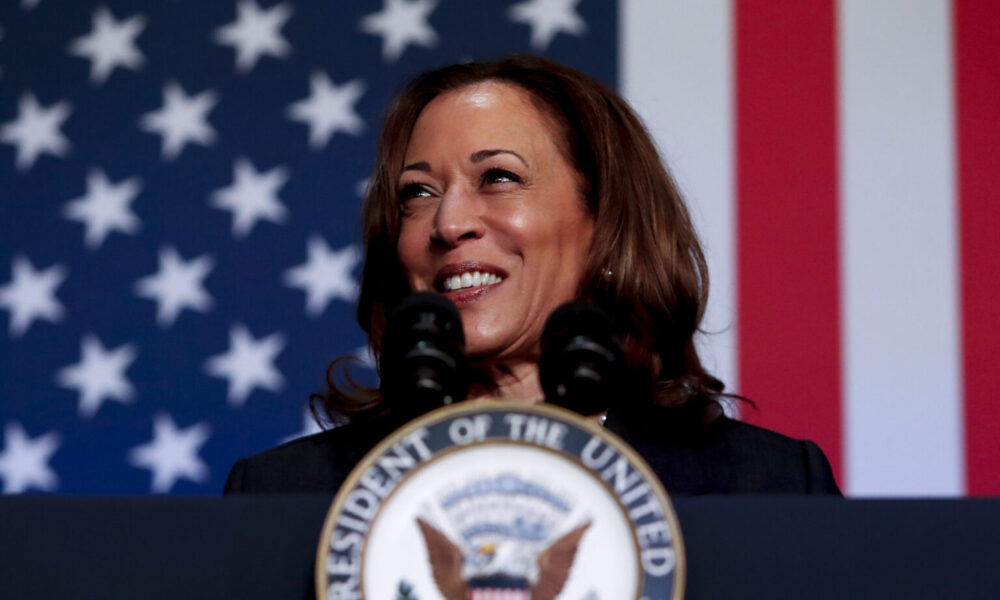Regulation
Kamala Harris Finds Ally in Ripple CEO Brad Garlinghouse Amid Crypto Backlash

Ripple CEO Brad Garlinghouse wants US Vice President Kamala Harris to be frank about cryptocurrency regulation. His comments come amid growing discussion about the administration’s digital currency policy and the VP withdrawal of the Bitcoin 2024 conference.
Many crypto market fans were hoping that Harris would attend the meeting. They believed it showed her softening on the digital currency. David Bailey, the CEO of the world’s largest Bitcoin conference, revealed that Harris had decided not to speak at the event.
Kamala Harris in the lens
Garlinghouse called for a break from political bias in his assessment of presidential candidates. His comment follows observations by Paradigm’s chief policy officer Justin Slaughter about the potential influence of US Vice President Kamala Harris if she were to run for president.
See more
Jumping to conclusions and making assumptions about candidates based solely on their political affiliation, without any policy proposals, is holding the crypto industry back (in the same way tribalism has been doing for years).
Vice President Harris is no stranger to Silicon Valley and has an incredible opportunity to… https://t.co/2kmKDZZXI
— Brad Garlinghouse (@bgarlinghouse) July 24, 2024
Arguing that tribalism and political prejudices have hampered the growth of the crypto sectorGarlinghouse favors a focus on political ideas rather than political connections.
Garlinghouse’s remarks reflect a growing attitude among crypto industry executives who believe that political forces have dominated important policy debates.
“We need to evaluate candidates based on their policy commitments rather than just their party line,” Garlinghouse said.
The view underscores the ongoing discussion within the industry about how to negotiate the difficult political terrain that has, in recent times, become more closely tied to cryptocurrency.
Harris’ potential impact: a double-edged sword
Slaughter’s latest post on X has gained attention because of the major changes Kamala Harris would make if elected president.
Slaughter claims Harris is ready to completely replace key national security positions, perhaps firing Biden’s current policy advisers. This suggested “reform” has raised questions about how it would affect U.S. policy on important issues, including the regulation of Bitcoin and cryptocurrencies as a whole.
See more
Harris has been running for about 12 hours, and she’s already making it clear that Biden’s top national security advisers won’t be retained for another term.
Members of the Biden administration should not be expected to remain in the Harris administration. The chances of a meaningful reset are increasing. https://t.co/vigIDUccgI
— Justin Slaughter (@JBSDC) July 23, 2024
Garlinghouse’s response to Slaughter’s assessment is both hopeful and cautious. While he is concerned about Harris’s propensity to adopt a rhetoric similar to that of anti-crypto Senator Elizabeth Warren, he also notes Harris’s extensive knowledge of Silicon Valley.
This understanding could help address legal hurdles facing the crypto industry, Garlinghouse said.
Voters and cryptocurrencies: a breath of fresh air
Interestingly, many crypto aficionados have turned to the Republican candidate Donald Trump as President Joe Biden’s administration, led by SEC Chairman Gary Gensler, faces criticism for its tough enforcement policies.
Voters who feel left out by current rules have resonated with Trump’s promises of pro-crypto measures.
The impact of Harris’ candidacy on crypto voters is yet to be seen. The industry is dead-set on any legislative changes that could encourage or discourage innovation.
Meanwhile, billionaire Mark Cuban thought Kamala Harris might take a more business-friendly approach to bitcoin and AI. While it is unverified, Harris advisers say she may be more supportive of these companies than her previous policies.
All things considered, Garlinghouse’s support for a policy-driven approach reflects a broader movement within the crypto community toward more complex policy assessments. The debate over how best to help the sector in an ever-changing political environment is growing as the U.S. presidential election approaches.
Featured image from Getty Images, chart from TradingView
